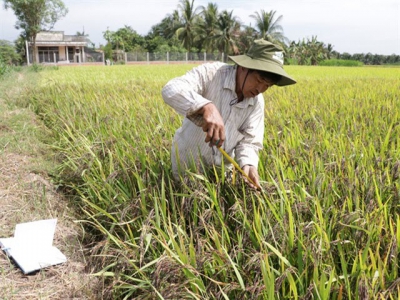No degree, no problem for this rice innovator

Research on creating new rice varieties is Phạm Văn Nhựt’s favourite work. — VNA/VNS Photo Huỳnh Phúc Hậu
BẾN TRE — Despite lacking a college or university education, farmer Phạm Văn Nhựt in Mekong Delta province of Bến Tre has made great contributions to agricultural development in his community
Nhựt, a 52-year-old from Giồng Trôm District’s Phong Mỹ Commune, has restored or created more than 10 rice varieties with high quality, productivity and pest-resistance.
There were many challenges on the way to his success. However, he overcame them with the determination of a war veteran.
After demobilisation from the army in 1987, Nhựt began rice cultivation on 3,000sq.m of land his parents gave him. Like other farmers at that time, he struggled to make ends meet.
He even thought of replacing rice with other plants after suffering losses for years.
In 1995, Nhựt had the chance to attend a training class on rice hybrids organised by Bến Tre Province’s Agricultural Breeding Centre in collaboration with Cần Thơ University.
Inspired by teachers like professor Huỳnh Quang Tín and Nguyễn Thi Thu Cúc from Cần Thơ University, he started creating his own rice strains.
"I wanted to generate a rice variety that is suitable to my locality to ease the hardship for local residents but I didn’t know how to do it. I only finished 12th grade at school and had not studied any special education yet," Nhựt recalled.
Then, in 2011, he was invited to take part in a programme on rice breeding and biodiversity conservation under the framework of a project sponsored by the Netherlands.
Through the training and visiting key rice-production provinces in Mekong Delta, Nhựt realised the need to restore OC10, a rice variety which suffered degradation, to provide salinity-resistant rice for local growers, which is also favoured by vermicelli makers.
It took him a year to complete the work. Following this success, Nhựt revived other rice varieties including AGPPS-103, Hậu Mỹ and Hòn Đất, which were all later certified.
Nhựt decided to expand his rice variety production.
He created a new rice variety named PM1 (Phong Mỹ 1) with high yield and pest-resistance.
“Despite having some advantages, I found out that the PM1 was not as delicious as I thought,” he said, adding that it took him three years to breed the variety.
Nhựt continued generating other new rice varieties.
He tested multiplying herbal rice seeds that his friend brought to him from Japan three years ago. Now he has more than 3,000sq.m planted with this kind of rice, yielding four tonnes per hectare.
The herbal rice was fed with organic fertiliser to protect the environment. Fortunately, the rice was popular among consumers. With price of herbal rice of between VNĐ20,000-40,000 (US$0.9-1.7) a kilo, double or four times higher than normal rice, farmers like him were in the money.
Nhựt also worked with farmer in his commune to set up Phong Mỹ Rice Breeding Production Unit, specialised in providing high quality rice varieties. Each year, the unit supplies hundreds tonnes of rice varieties to the market.
In addition, Nhựt has signed contracts with local farmers on organic farming to grow LH16 and herbal rice varieties and he takes care of sales.
Nhựt said in the future he could collaborate with other farmers in building a brand for rice from Phong Mỹ Commune.
As his prestige spread over Mekong Delta, a Lao company invited him to go the Champasak, a province in southwestern Laos, to introduce his techniques to local farmers. It was here that he taught local residents how to use plowing and sowing machines.
Convinced by the effectiveness of the restored OC10, the Laos government decided to buy the rice seeds for cultivation.
Thanks to his achievements, Nhựt won the title ‘Rice variety breeding and biodiversity conservation farmers in 1995-2015 from the Mekong Delta Development Research Institute and was honoured as an excellent farmer by provincial authorities in 2014 and 2016.
“Nhựt was the one who pioneered in start-up business in the locality,” said Hồ Văn Trí, chairman of Phong Mỹ Commune’s People’s Committee.
Thanks to his efforts, Nhựt’s family earns hundreds of millions of Vietnamese đồng each year through rice cultivation, he said.
Trí hoped that in the future more support would be given to Nhựt so he could expand his organic production. Once local rice had a trademark, income for local farmers would be boosted, he said.
Có thể bạn quan tâm
 New study to track ways to cut phosphorus runoff
New study to track ways to cut phosphorus runoff Study specifically targets elevated phosphorus fields in Ohio's Maumee River watershed.
 Vietnam works to boost organic farming
Vietnam works to boost organic farming Vietnam has been making efforts to foster organic farming, including a decree issued last August which should be implemented as soon as possible
 Search The sad year of coffee exports
Search The sad year of coffee exports Throughout the year, despite the increase in volume, the price of coffee exports continuously recorded a downward trend.